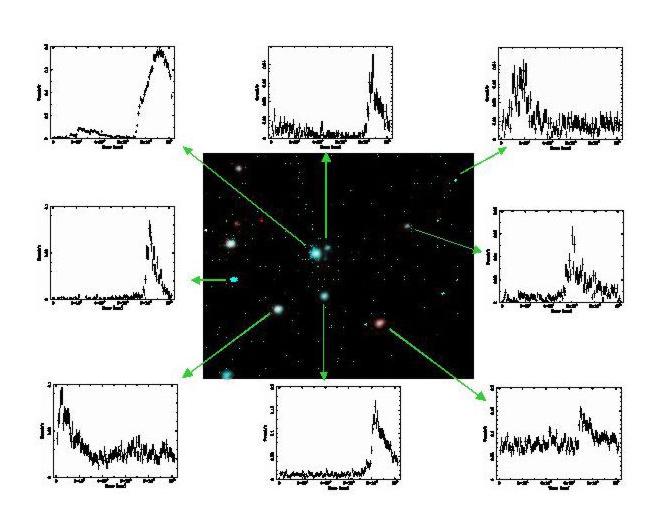
 Credit: K. Koyama (Kyoto U), Y. Tsuboi (Penn State)/NASA/CXC
Credit: K. Koyama (Kyoto U), Y. Tsuboi (Penn State)/NASA/CXC
Holiday Lights
Young stellar objects (YSOs) are newborn stars which are just forming out
of massive clouds of gas and dust which are distributed throughout the
Galaxy. A single cloud can form dozens or hundreds of stars, so that most
young stars are found in groups. Like young children, these young stars
are extremely active. This activity shows up clearly in X-rays. The X-ray
emission from YSOs tends to be very erratic, probably due to the occurence
of stellar type flares, like the more familiar flares
which occur on the Sun, but many times more powerful. Now the Chandra
X-ray observatory's ACIS
camera has provided astronomers with the best view of this
extraordinary activity. The image above shows a Chandra
ACIS image of an enormous stellar nursery, a giant cloud of gas and
dust in the constellation of Ophiuchus. The bright points in the image are
X-ray emitting stars (the red stars suffer less absorption from the cloud
and presumably are on the near side of the cloud, while the blue stars are
more absorbed and presumably buried deeper in the cloud). Because ACIS
measures the time of arrival of each X-ray photon it detects, astronomers
can use the ACIS data to measure the brightness of the X-ray source with
time. The graphs attached to each X-ray star shows the variation of the
stellar X-ray brightness. The rise in each graph indicates a time when the
star was undergoing an increase in X-ray brightness due to a stellar flare.
Thus, in a
time-lapsed X-ray movie of this molecular cloud, the stars blink on and
off like lights on a Christmas tree.
Last Week *
HEA Dictionary * Archive
* Search HEAPOW
* Education
Each week the HEASARC
brings you new, exciting and beautiful images from X-ray and Gamma ray
astronomy. Check back each week and be sure to check out the HEAPOW archive!
Page Author: Dr. Michael F.
Corcoran
Last modified December 25, 2005


